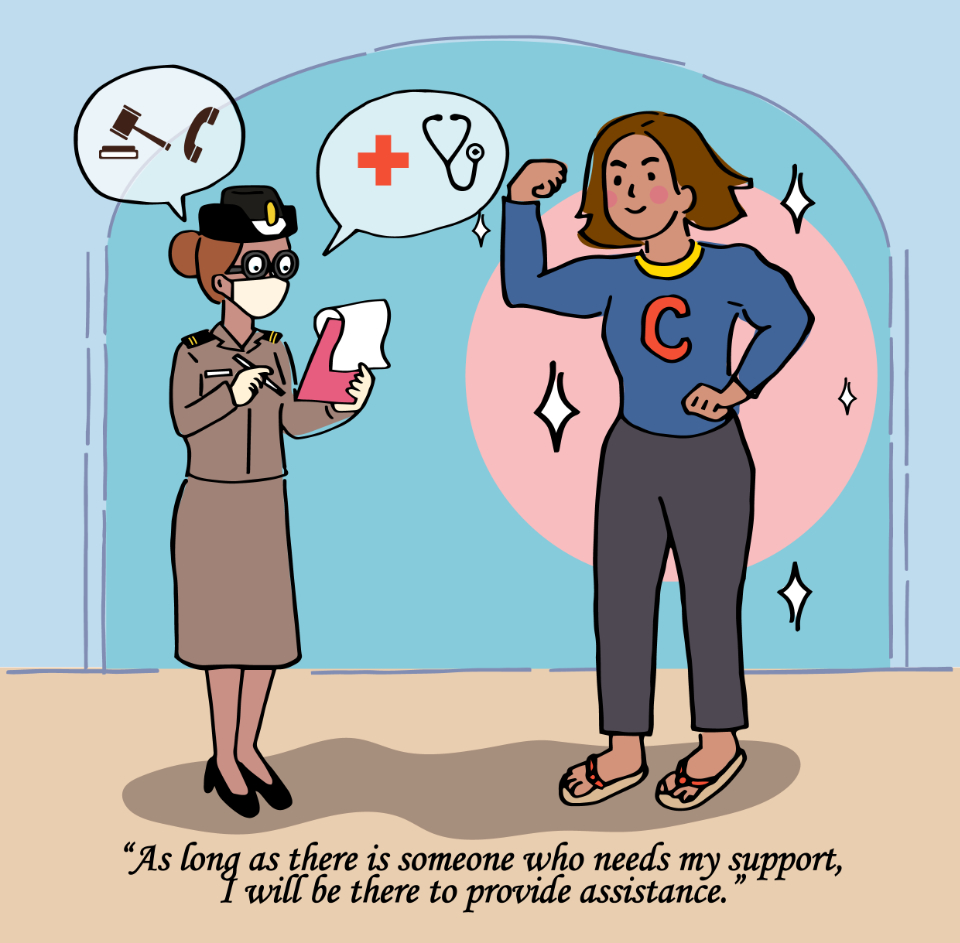“As long as there is someone who needs my support, I will be there to provide assistance.”
Interview with Kong Ravin, Deputy Chief of Unit of the Anti-Human Trafficking and Juvenile Protection Bureau, Provincial Police Commissioner, Kandal Province, Cambodia.Date:

Kong: I always proudly say that I am a female police officer. To be more specific, I am Deputy Chief of the Anti-Human Trafficking and Juvenile Protection Bureau, Provincial Police Commissioner at Kandal Province in Cambodia. It has been 6 years since I began serving the community as a judicial police officer. I love supporting survivors, especially women and girls who have experienced abuse or rape. Other female police officers and I play a critical role in not only the arrest of perpetrators but also bringing justice to survivors, which they deserve. There should be more female police officers.
If there was no pandemic, my daily routine would depend on the cases we receive. It could be supporting survivors of trafficking in persons, transferring survivors to shelters, or filing a case of domestic violence. However, I guess like all of us, a new task has been added to my routine which is patrolling the quarantine centres. I take turns with my colleagues with this new duty, and make sure people are following the centre rules. There are many returnee women migrant workers who stay in the quarantine centres. They have certain things in common, which make it easy for them to become close. However, rules are rules, and they have to keep a distance from each other. It is my job to make sure social distancing is in place even at the quarantine centres.
Now I am a bit used to the challenges, however, I was very scared and had no clue what to do when the COVID-19 pandemic first started. I was concerned about my family. I even asked my mother not to go to the hospital to get her regular prescription. I did not want to leave my house, and wanted to stay at home with my family. However, it is my duty to protect everyone, not just from the virus, but also from the violence that could still occur during the pandemic. The police made the decision to call all the officers to be on mission for 24 hours while COVID-19 was at its peak, which I didn’t mind at all. As long as there is someone who needs my support, I will be there to provide assistance.
I recall, there was a case of a Cambodian woman who migrated to China for work, however, once she arrived at the airport she was involuntarily ‘sold’ as a bride, and her passport was taken away from her. Worst of all, she was trapped in the house and exposed to the abusive behaviour of her ‘husband’. Luckily, her family could contact us for help, and we could jump into the situation to arrange her repatriation. Unfortunately, she is not the only one who has gone through this experience.
It’s good to migrate. It is their choice, and they have the right to make that decision. I think it takes courage to be a woman migrant worker, and I respect that. One thing I would like to say to women who are thinking about migrating to another country for work is: please double-check and triple-check if the path you are choosing is safe, and be fully informed of the laws, policies, regulations of Cambodia and the country of destination. Remember emergency contact information, or at least carry the information with you always.
My message for all the community members here is: we should not judge or discriminate against women migrant workers. I know there is a false stereotype of women who work abroad and come back home, but they migrate to work for their family. They should be called “sheroes” of their families. For police officers like me, my message is: let us remind ourselves that it is our duty to protect women migrant workers and to equip ourselves with up-to-date knowledge on things like how to get support from the embassies and relevant contact information to be able to refer cases involving women migrant workers. We all have our roles in ending violence against women migrant workers.
The ILO-UN Women programme “Safe and Fair: Realizing women migrant workers’ rights and opportunities in the ASEAN region”, under the global EU-UN Spotlight Initiative to eliminate violence against women and girls, supports front-line service providers to ensure essential services are available for women migrant workers who are subject to violence. More: www.spotlightinitiative.org/safe-and-fair
If you or someone you know has experienced violence against women in Cambodia and need immediate support, contact the police.
- Police helpline number for survivors of violence against women, trafficking in persons: 1288
More contacts of service providers are available in the Service Directory for Women Migrant Workers in the ASEAN region: https://bit.ly/services4wmw
Interviewed by Sophea Khun
Written by Younghwa Choi
Edited by Gihan Hassanein